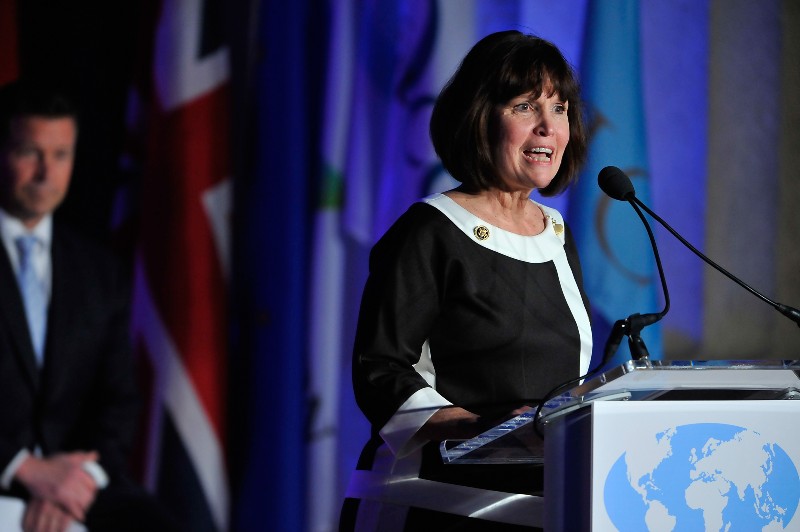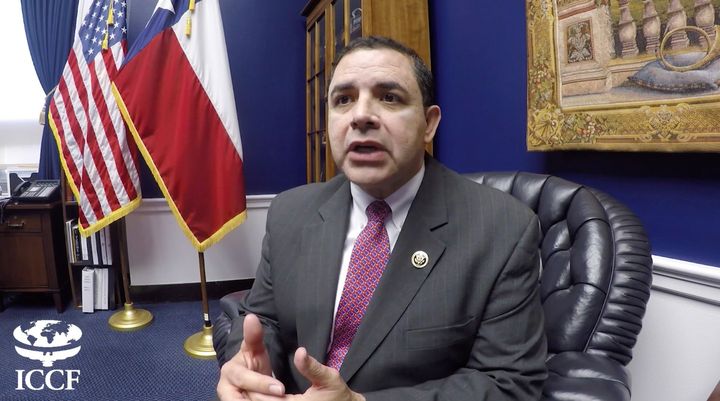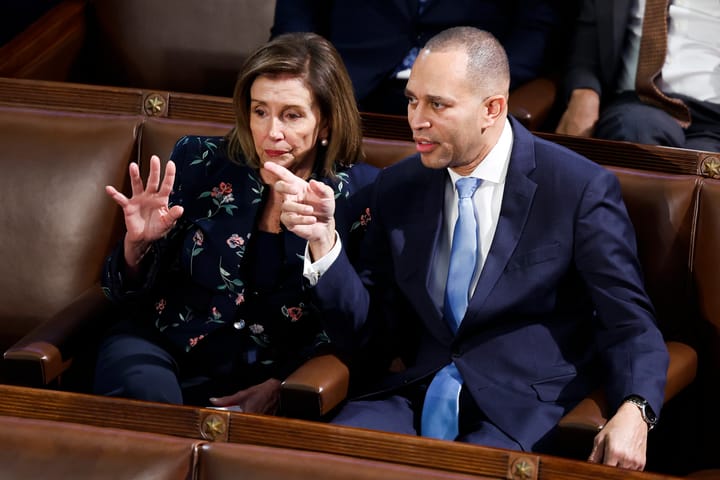The warming climate is bringing about a new wave of species extinctions, acidifying the oceans, and causing droughts and wildfires that emit carbon and contribute to climate change.
But you won’t hear anything about it from the largest environment-focused member organization in Congress, the International Conservation Caucus (ICC).
Composed of more than a quarter of both the House and Senate, including both Democrats and Republicans, the ICC says its 137 members share a conviction to conserve and responsibly manage natural resources.
The caucus, however, barely mentions climate change on its website and does not back climate proposals in Congress that would reduce polluting emissions, measures that conservationists say are necessary and are opposed by the fossil fuel industry. The ICC promotes its work in areas like instructing the U.S. Postal Service to continue selling tiger stamps to fund international conservation efforts and sponsoring new research into plastic marine debris.
The ICC is supported by the 501(c)(3) nonprofit International Conservation Caucus Foundation (ICCF), which says it brings together “leaders at the highest levels of government” with business and NGOs to seek consensus on “market-oriented conservation solutions.”
Climate change, pollution, and exploitation of natural resources are main drivers of species loss that threatens one million species with extinction, according to a 2019 United Nations study. A recent University of Arizona study found that more than a third of all animal and plant species face extinction by 2070 due to climate change, identifying the hottest daily highs in summer as a key variable in population survival.
“You can’t work on international wildlife issues today and not work on climate change,” said Kierán Suckling, the co-founder and executive director since 1989 of the nonprofit Center for Biological Diversity, of the ICCF and its members. “It’s the biggest threat and the biggest promise in terms of mitigation, so you have to ask what they’re getting out of it. In every area where they work, there are already groups and alliances doing much more effective public work. It looks like pure pay-to-play to me.”
The ICCF says it provides its donors with “unparalleled opportunity for access and visibility” to some of the most powerful members of Congress, according to documents reviewed by Mother Jones. Lawmakers that join the group are given photo-friendly promotional material on their conservation efforts with large, recognizable environmental groups.
Several of the ICCF’s more than 50 partners are pillars of the fossil fuel industry: oil supermajor ExxonMobil; plastics industry trade group the American Chemical Council, a top spender on Hill lobbying; and Bank of America, which has provided nearly $200 billion in financing to the fossil fuel industry since the 2015 Paris Agreement on climate change. The sponsors of its most recent congressional gala include ExxonMobil, Walton Family Foundation, BumbleBee Foods, and Coca-Cola.
Lending environmental credibility to the group are several well-known NGOs, including the World Wildlife Fund, National Audubon Society, Rainforest Alliance, and the International Fund for Animal Welfare.
World Wildlife Fund’s website says that “Climate change poses a fundamental threat to the places, species and people’s livelihoods WWF works to protect,” while the National Audubon Society’s site calls for “dramatically reducing carbon emissions” to “achieve net-zero emissions by 2050.” Neither group responded to inquiries from Sludge as to how they account for their ICCF membership alongside fossil fuel lobbyists, or whether they put any internal pressure on business groups in the ICCF to support climate policies in line with the Paris Agreement.
The National Audubon Society lists several fossil fuel giants as donors at the level of $10,000 and above in its most recent annual report, including Chevron, major utility company American Electric Power, Maryland utility company BGE, Duke Energy, and utility holding company Xcel Energy. ExxonMobil is listed as a donor in the $5,000-$9,000 tier.
“Fossil fuels are one of main sources of air pollution, which stands to undo much of what we accomplished in conservation successes of the past 50 years,” said Suckling. “Given that centrality, to give ‘green cover’ to the very politicians who are backing the fossil fuel industry and fighting every motion to combat fossil fuel emissions seems really self-defeating at best and cynical and profiteering at worst.”
‘Big Oil’s Favorite Democrat’ as Co-Chair
The ICC’s silence on climate policy is exemplified by one of its four House co-chairs, Rep. Henry Cuellar (D-Texas). Throughout his nine terms in office, Cuellar has been a key ally of the fossil fuel industry and has a lifetime environmental voting score of 47% from the League of Conservation Voters (LCV), by far the lowest among House Democrats. From a south Texas congressional district with heavy oil and gas industry presence, Cuellar is known for giving bipartisanship to Republican efforts such as 2015’s push by fellow Texas Rep. Joe Barton to lift the U.S. ban on crude oil exports.
Cuellar’s office has promoted his participation in ICCF events such as the Conservation Council Luncheon and he gets tagged in ICCF tweets that feature photos of elephants in the Okavango River Basin.
Cuellar benefited in his narrowly-won primary last year from $720,000 in outside spending from a pop-up “dark money” group that was funded by $1.3 million from oil and gas trade association the American Petroleum Institute (API). ICCF received a $25,000 donation from API in 2010, according to tax documents.
In the 2020 election cycle, Cuellar received the ninth-highest amount among House members from the oil and gas industry at nearly $220,000, according to the Center for Responsive Politics, and the industry has been his highest career donor, giving over $948,000 to his campaigns. His website’s page on Energy and Environment favors an “all of the above” approach to federal energy investment, including oil and natural gas, even as ICCF partner the National Audubon Society says it supports “a transition to 100% clean electricity.”
Over the years, Cuellar has been treated to several trips by ICCF, including one in April to Isle of Palms, South Carolina, attended by the congressman and his spouse. Past destinations for Cuellar’s ICCF-sponsored travel have included Colombia, Peru, Germany, and Botswana. In 2015, ICCF brought Cuellar’s legislative director on a trip to the Majete Reserve in Malawi’s Liwande National Park.
Cuellar’s office did not respond to a request for comment on the ICC’s priorities in the 117th Congress on climate policy or his views on reducing greenhouse gas emissions.
Exotic Trips
The other House Democratic co-chair of the ICC is Rep. Betty McCollum of Minnesota, a strong environmentalist with a 94% lifetime score from LCV, whose page on the Energy and Environment reads, “Instead of doubling down on fossil fuels, I support strategic investments in clean energy infrastructure, research, and education.”
Last month, from April 16-18, McCollum joined the ICCF-sponsored trip to the oceanfront city of Isle of Palms, South Carolina to “identify the ICC’s priorities and legislative agenda for the 117th Congress” with several other House members, including co-chairs Rep. Jeff Fortenberry (R-Neb.) and Rep. David Joyce (R-Ohio). McCollum’s office did not respond to Sludge’s inquiries about the ICC’s priorities on climate policy, or the potential influence of fossil fuel industry partners of the junket over policymaking on reducing emissions.

Since the Paris Agreement, ICCF has sponsored trips for nearly two dozen members of Congress and their senior staffers to locations including Linyanti Wildlife Reserve in Botswana, Gorongosa National Park in Mozambique; prior destinations included Playa Grande beach in Costa Rica.
“I can’t really find any outcome of these caucuses,” Suckling said. “It’s just not clear what they accomplish other than providing a pay-for-play opportunity for nonprofits to interact with U.S. congresspeople, especially conservatives with terrible environmental voting records. That makes it financially lucrative, because that’s the kind of thing some groups are willing to pay for.
“There’s no other reason except to hobnob with powerful figures and in doing so you are giving them environmental credibility,” Suckling said.
Politicians like Sen. Chris Coons (D-Del.) promote their participation in ICCF events on social media, such as a January briefing on “nature-based carbon storage solutions” with Republican Sen. Mike Braun of Indiana and Republican Rep. Bruce Westerman of Arkansas.
In other tweets, the ICCF promotes Sen. Coons and Senate co-chair Rob Portman of Ohio speaking to “the bipartisan consensus around combating wildlife trafficking,” or their collaboration with the government of Germany on stopping marine litter. Sen. Coons tweeted out a photo of himself hugging a baby elephant with former Republican Sen. Jeff Flake, shirtsleeves rolled up and grinning.
Greenwashing for Polluting Companies
Sludge sent ICCF several questions about its position on climate policy that reduces carbon emissions and the conflicts of interest posed by its fossil fuel industry partners. Over email, ICCF said, “We are proud to bring together a diverse group of public- and private-sector stakeholders to find consensus and inspire nonpartisan policy solutions that preserve and protect the health of the planet.”
The nonprofit did not respond to Sludge’s questions about the dues paid by ICCF partners like ExxonMobil and ACC. In 2013, Mother Jones reported that ICCF membership started at $25,000 annually, with a tier at $50,000 to host congressional briefings and a special $100,000 “Teddy Roosevelt” level.
The foundation promotes its annual gala, first held in 2006, with members of the U.S. cabinet and over 100 members of Congress in attendance, “offering an unparalleled opportunity for special guest speakers to simultaneously address the most popular bipartisan caucus on capitol hill.”

Other current ICCF partners include Coca-Cola, which the “Break Free from Plastic” campaign named last year as the worst plastic polluting company for the third year in a row; Volkswagen Group of America, a member of auto industry lobbying group the Alliance for Automotive Innovation; and the Walmart founders’ Walton Family Foundation.
Past ICCF partners have included investor-owned utility company Pacific Gas & Electric; Nestlé, the third-worst plastic polluter; Barclays, named by Rainforest Action Network this year as the worst bank in Europe in its financing of the fossil fuel industry; and JPMorgan Chase, rated by RAN as the worst global bank on climate, with over $317 billion in financing provided for extractive energy.
Another ICCF partner, the American Chemistry Council (ACC), represents companies that make products from petroleum and was the twelfth-highest spender on federal lobbying last year at $14 million. Its members include ExxonMobil, Chevron, Shell, and major chemical companies such as Dow. The 3M conglomerate, an ICCF partner, is an ACC member and has an oil and gas division.
Lobbyist Board Members
Four members of ICCF’s six-member board of directors, all former U.S. representatives, have worked as federal lobbyists for the fossil fuel industry.
Former Rep. Ed Royce, a Republican from California who retired from his House seat in 2018, was a founding co-chair of the ICC in 2003. Royce last year joined the second-largest federal lobbying firm by revenue, Brownstein Hyatt Farber Schreck, whose clients include API and many oil and gas companies. Since 2020, Royce has lobbied for Talos Energy, an independent oil and gas company “focused on offshore exploration and production” in the Gulf Coast region.
Former Rep. John S. Tanner, a Democrat from a congressional district in West Tennessee and ICCF board member who founded the Blue Dog Caucus of conservative Democrats, was from his retirement from office in 2010 to 2019 the vice chair of Prime Policy Group, whose recent clients have included utility company CenterPoint Energy and petroleum refining company Vertex Energy.
With Prime Policy Group in 2013, Tanner lobbied for the collapsed oil and gas giant Yukos, then in international arbitration; in 2014 and 2016, for the In Situ Oil Sands Alliance, which represents Canadian oil sands drilling companies; and in 2015, for the National Rural Electric Cooperative Association, whose members remain coal-dependent and which recently criticized President Biden’s goal of decarbonizing the power sector by 2035.
Former Florida Democratic Rep. Allen Boyd, an ICCF board member, also lobbied for the In Situ Oil Sands Alliance from 2012 to 2018 with the firm he co-founded, Cannae Policy Group.
Former Florida Republican Rep. Connie Mack IV, another ICCF director, is a lobbyist for electric services company Mammoth Energy Services through the firm Black Diamond Strategies. In 2019, the firm lobbied for Process and Industrial Developments Limited, a fossil gas processing firm in a legal dispute with the government of Nigeria over pipeline infrastructure.
In its most recent available tax disclosure, ICCF reported bringing in over $3.8 million in revenue in 2019, compensating board member and president John Gantt Jr. at over $275,000, and board member and executive vice president Susan Lylis at nearly $181,000.
ICC Senate Members Blocking a Key Convention
The ICC’s 35 Senate members count 19 Republicans, including several with some of the lowest lifetime environmental votings scores from LCV: Tennessee’s Marsha Blackburn, tied for nearly the lowest score at 3%; Indiana’s Mike Braun and Arkansas’ Tom Cotton, at 4%; and Oklahoma’s James Inhofe, who rejects the scientific consensus on climate change, at 5%.
Since the early 1990s, Republican senators have blocked U.S. ratification of the Convention on Biological Diversity, an international agreement to protect species and ecosystems signed by every other United Nations member state. Suckling described the treaty as a “very important international effort, parallel to the Intergovernmental Panel on Climate Change in the climate arena, and one where the U.S. has played an equally strange and uneven role.”
Joining the convention was supported in a recent op-ed by a research scientist with ICCF partner the National Audubon Society, but doing so would require a two-thirds Senate majority—feasible if nearly all Republican members of the ICC joined with nearly all Democrats, but likely to continue being blocked by Republican lawmakers opposed to environmental regulations.


